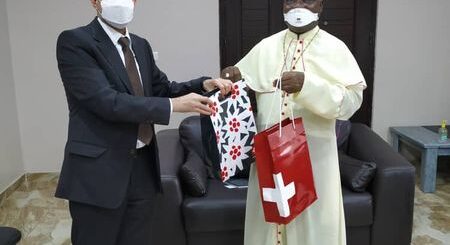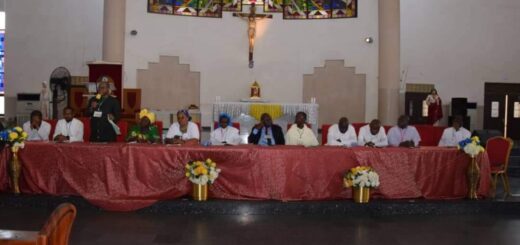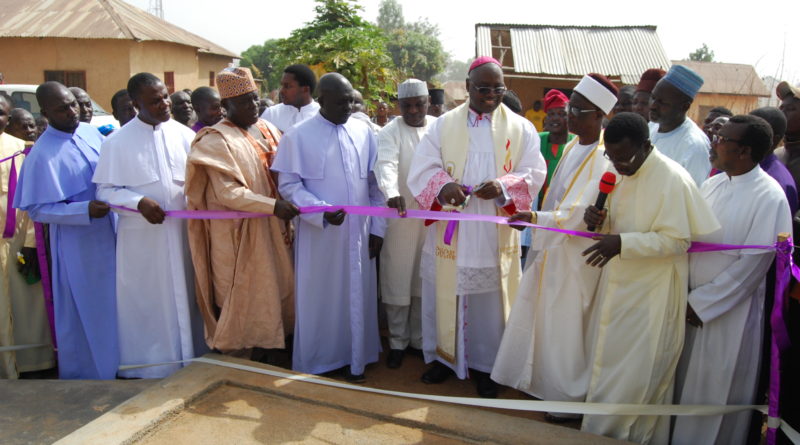Exploring Forgiveness
by ARCH BISHOP · September 13, 2020
24th Sunday Homily by Archbishop I. A. Kaigama at Holy Cross Parish Apo, Abuja. 13th September, 2020.
Readings: Sirach 27:30-28:7; Romans 14: 7-9; Mathew 18: 21-35
“Forgive us our trespasses as we forgive those who wrong us” is so easily said when we pray the “Our Father”. The reality is that when human beings feel really hurt, it is not easy to forgive, i.e. to transit from the theory of forgiveness to the praxis of forgiveness.
Someone will tell you, “I have forgiven, but I will never forget,” or “I have buried the hatchet, but I marked the spot.”
Similarly, in the “Our Father,” we pray that God’s will be done, but when challenges weigh down so much on us, we wonder what has become of God and run from pillar to post looking for remedies that are not of God.
Our subject matter today is forgiveness, forgiveness which comes from the heart instead of from the head (mental). Forgiveness takes various forms: the forgiveness an individual receives from God; the forgiveness one offers to another, the forgiveness I receive from another person; the forgiveness a group offers to another group, which is what we badly need in various parts of Nigeria today experiencing violence and conflicts, leading to the wasting of human lives and resources. Whole-hearted forgiveness by all is what will heal Nigerians and speed up our social integration and progress.
Some of us make the mistake that they have not offended anyone and so they have no need of forgiveness. You have to remember that sometimes your presence, your disposition, your body language, your talents, the way you speak or do your work which you consider normal, offend and upset others and generate unhealthy anger or even deep seated jealousy for inexplicable reasons. The solution is: offer forgiveness and beg for forgiveness.
Jesus taught us last Sunday how to reconcile with one another. Today He teaches us to forgive unconditionally. We should therefore pray for the grace to give and receive forgiveness. Sirach 28:1-8 urges, “Forgive your neighbour the hurt he does you, and when you pray, your sins will be forgiven….Stop hating….Remember death, remember the covenant of the Most High, and overlook the offence” (of your neighbour).
I repeat that we should pray for the grace to forgive no matter how hurt or bitter we may feel. We must also pray that God will give those who feel offended because of our not deliberate actions, acts of omissions and commissions, to know that we mean no harm to them so that they can liberate themselves of the feelings of bitterness and prejudice against us. Many around us go about imagining that some people are their enemies, and they invoke “Holy Ghost fire” to burn and consume such enemies.
Jesus in the parable of the servant who having been forgiven his debt of ten thousand talents, refused to forgive a neighbour who owed him only a hundred denarii, teaches us how it is imperative to forgive if we must receive God’s forgiveness and have peace of mind. The example of Jesus’ unconditional forgiveness on the cross is very edifying: “Father, forgive them for they do not know what they are doing” (Lk. 23:34).
In the Gospel passage, Peter put before Jesus the question, “Lord, if my brother sins against me, how often must I forgive? As many as seven times?” (Mt. 18:21). Jesus answered, “I say to you, not seven times but seventy-seven times” (Mt. 18:22). Peter thought like the Jewish rabbis that there was a limit to forgiveness, that one only needed to forgive someone three times at most. He thought it was being very generous to forgive seven times. Jesus’ response to forgive seventy-seven times shows that there is no limit to forgiveness. One must forgive as many times as one is hurt. Stop counting. The practice of retributive justice in the Old Testament of “an eye for an eye, and a tooth for a tooth” (Ex. 21:24) is not valid for the good follower of Christ.
Ask yourself this question: If you were the young David after King Saul tried to kill you and you escaped only to find him deep asleep in a bush, with his spear fixed to the ground near his head, what would you do? Read 1 Samuel 26:7-25.
Things to learn today:
“The Lord is merciful and gracious, slow to anger and abounding in steadfast love” says the psalmist today in Psalm 103:8, so learn to overcome evil with good (cf. Rom. 12:21).
With genuine forgiveness most social crises can be curtailed and brought under control. Peace can be restored in broken homes, society and the world at large.
We free our hearts of all the negative feelings and effects of resentment: hostility, hatred, insecurity and hurtful feelings which cause us emotional, psychological and physical harm; we remove the toxic wastes from our souls.
Forgiveness benefits the forgiver more than the forgiven. It is therapeutic.
Forgiving one who offends us is a prerequisite for receiving God’s forgiveness.
When we forgive, we show that we are children of God, who makes His sun rise on the bad and the good, and causes rain to fall on the just and the unjust (cf. Mt. 5:45).
Forgiveness is a virtuous act and it is sinful not to forgive. St. Francis of Assisi in his prayer for peace prays that where there is injury we offer pardon.
Pray for and forgive our offenders whether living or dead as St. Paul tells us that, a Christian living or dead belongs to Christ (cf. Rom. 14:8).
A powerful channel of forgiveness is the Sacrament of Reconciliation. Frequent it.
While forgiveness cannot change the past, it can shape the future.
To you in the “mechanic village,” Apo, where I understand vehicles are brought for repairs, realize that we all have a duty to repair the broken engines of the hearts of one another through acts of forgiveness and love.




